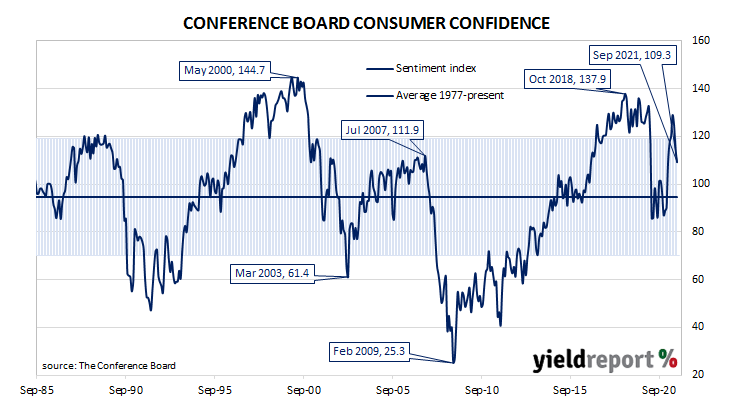Summary: Conference Board Consumer Confidence Index fall for third consecutive month in September; reading below expected figure; views of present conditions, short-term outlook both less positive; concerns regarding Delta, US economy, elevated inflation dampens optimism; 30% fall in new case numbers from peak should see higher optimism over coming months if higher Delta cases behind result.
After the GFC in 2008/09, US consumer confidence clawed its way back to neutral over a number of years and then went from strength to strength until late 2018. Measures of consumer confidence then oscillated within a fairly narrow band at historically high levels until they plunged in early 2020. Subsequent readings then fluctuated around the long-term average until March this year when they reached elevated levels.
The latest Conference Board survey held during the first three weeks of September indicated US consumer confidence deteriorated for a third consecutive month. September’s Consumer Confidence Index registered a preliminary reading of 109.3, below the median consensus figure of 114.6 and August’s final figure of 115.2.
Consumers’ views of present conditions and their outlook for the near-future were both less positive. The Present Situation Index fell from a revised figure of 148.9 to 143.4 while the Expectations Index decreased from a revised figure of 92.8 to 86.6.
“Consumer confidence dropped in September as the spread of the Delta variant continued to dampen optimism,” said Lynn Franco, a senior director at The Conference Board. “Concerns about the state of the economy and short-term growth prospects deepened, while spending intentions for homes, autos and major appliances all retreated again. Short-term inflation concerns eased somewhat but remain elevated.”
Long-term US Treasury bond yields increased noticeably on the day as another Fed official said he was in favour of two rate rises next year and Fed Chair Jerome Powell noted higher energy prices may prolong high inflation rates. By the close of business, the 10-year Treasury bond yield had added 7bps to 1.55% and the 30-years had jumped 11bps to 2.10%. The 2-year yield finished unchanged at 0.31%.
In terms of US Fed policy, expectations of any change in the federal funds rate over the next 12 months remained low. Federal funds futures contracts for September 2022 implied an effective federal funds rate of 0.17%, about 9bps above the current spot rate.
NAB senior economist Tapas Strickland said if higher Delta cases were substantially behind the result “then the 30% fall in new case numbers from their peak should see a reversal over coming months.” However, he also noted consumer inflation rates in excess of 5% were also a factor which had “not gone unnoticed by consumers.”
The Consumer Confidence Survey is one of two monthly US consumer sentiment surveys which result in the construction of an index. The Conference Board’s index is based on perceptions of current business and employment conditions, as well as respondents’ expectations of conditions six months in the future. The other survey, conducted by the University of Michigan, is similar and it is used to produce an Index of Consumer Sentiment. That survey differs in that it also includes some longer-term questions.


